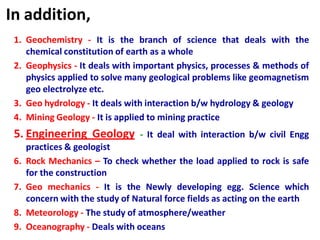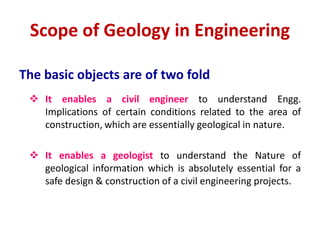1 Unit-I Scope of Geology in Engineering
- 2. GEOLOGY Definition: • The sciences that deal with one or more aspects of the Earth as a planet are grouped together as Earth science. Geo-Earth ; Loges – science Earth science Geology • It is the science that deals with the study of Earth as a whole.
- 3. Study of Earth as a Planet Origin • Hypothesis • Continental drift theory • Palaeo Magnetism • Plate Tectonics Age • By Radioactivity Structure • Internal structure
- 4. • Evolution, modification and Extinction – surface and subsurface features • Mountains • Plateaus • Plains • Valleys • Basins • Caves • Coastal, marine and submarine forms • Deals with the materials making up the Earth • Atmosphere • Lithosphere • Hydrosphere • Biosphere • Considered as fundamental basic science like Physics, Chemistry, Biology
- 5. Branches of Geology 1. Physical Geology - The structural disposition of the rock bodies & huge bodies of water & ice form other specific subjects of study is physical Geology. It deals with internal agents (volcanism & earthquake) External agents (wind, water, ice & atmosphere) 2. Geomorphology - The study of the features of the earth surfaces mainly the land like mountains, plains, plateaus, valleys & basins. 3. Mineralogy - It deals with formation, occurrence, aggregation, properties & uses of minerals crystallography branch mineralogy. 4. Petrology - It deals with formation of various types of rocks, their mode of occurrence, their composition texture, structures, geological & graphical distribution of rocks. It is subdivided into. 1. Palacogeography 2. Paleontology 3. Stratigiaphy 5. Economic Geology - It deals with study of minerals & rocks which can be exploited for he benefits of man. These include. 1. Ore Iron, aluminum, copper 2. Non Ore building stones, rock salt, coal, petroleum, Natural gas
- 6. In addition, 1. Geochemistry - It is the branch of science that deals with the chemical constitution of earth as a whole 2. Geophysics - It deals with important physics, processes & methods of physics applied to solve many geological problems like geomagnetism geo electrolyze etc. 3. Geo hydrology - It deals with interaction b/w hydrology & geology 4. Mining Geology - It is applied to mining practice 5. Engineering Geology - It deal with interaction b/w civil Engg practices & geologist 6. Rock Mechanics – To check whether the load applied to rock is safe for the construction 7. Geo mechanics - It is the Newly developing egg. Science which concern with the study of Natural force fields as acting on the earth 8. Meteorology - The study of atmosphere/weather 9. Oceanography - Deals with oceans
- 7. Engineering Geology • EG may be defined as that branch of applied sciences which deals with the application of geology for a • safe, • Stable, • economical design & construction of civil engineering projects
- 8. The basic objects are of two fold It enables a civil engineer to understand Engg. Implications of certain conditions related to the area of construction, which are essentially geological in nature. It enables a geologist to understand the Nature of geological information which is absolutely essential for a safe design & construction of a civil engineering projects. Scope of Geology in Engineering
- 9. • The major activities of a professional civil engineering are in Construction job Water Resource Development Town & Regional Planning
- 10. I) Geology in construction jobs In all heavy construction jobs like • Dams & reservoirs • Tower • Tanks • Highways & bridges • Traffic & hydro power tunnels • Embankments & retaining structures • Lining of canals • Laying of drainage pipes etc • We need to have a clear idea about the site, Planning, Design, Construction.
- 11. 1) Planning Topographic Maps • Relief features - essential to understand the merits & demerits • The nature of slopes, depth of valley, • Rate of change to elevation in various directions can be easily computed. Hydrological maps • Surface & subsurface water channel, its occurrence & depth. Geological Maps • Rock types • Structural disposition of rocks • Materials of construction • Exploratory operations (test holes etc.) • Subsurface investigation
- 12. ii) Design – The existence of hard bedrocks & their depth from & inclination with the surface. – The Mechanical properties of the rock especially compressive, shear & transverse strength, modulus of elasticity, permeability & resistance to decay.
- 13. iii) Construction – To check the quality control of the construction materials like sands, gravels, gushed rocks & soil. – all are best understood in Geological perspective.
- 14. II) Geology in water Resources Development • Water is an basic needs to our life • Water cycle is the term given to the sum total of water cycle: – evaporation of water from the hydrosphere + its precipitation in the form of rain & snow + flow back into the lakes, sea & oceans. • It depends on Surface & subsurface water.
- 15. III. Geology in Town & Regional planning • A town planner is concerned with landscape & its utilization – i.e. maximum benefits with minimum of disturbance to Natural environment. • A regional planner is responsible for adopting an integrated approach in all such cases of allocation of land for development projects.
- 16. Responsibilities of Civil Engineer • Geological mapping • Exploration • Project planning • Hydrological / surface water maps • Hydrogeological maps • Slope stability/landslide/landslip • Hydraulic structure / Dams and Reservoirs • Seismic hazard/seismicity • Environmental Impact Assessment Civil Engineers and Geologist work together in Major Civil Engg Srtucture in different levels: 1. Planning 2. Design 3. Construction 4. Maintanence
- 17. Geology in other fields • Land evaluation • Oceanography • Space exploration nuclear explosions
















